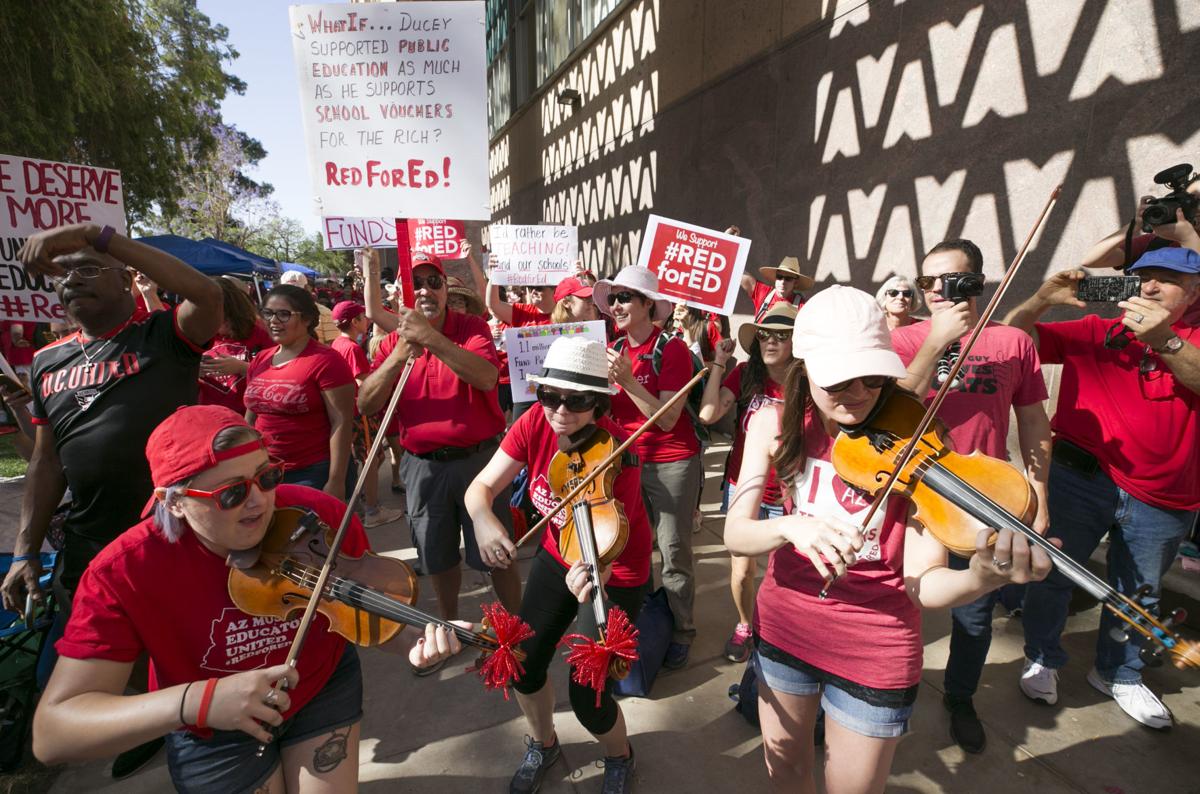PHOENIX — The longest statewide teacher strike is going to drag into another day Thursday, at least for some of those who have been out of work now since last Thursday.
Education groups had said Tuesday they would go back to their classrooms Thursday based on the belief that the spending plan — and the money for a promised teacher pay hike — was pretty much locked in and would be enacted and on the governor's desk by the end of the day Wednesday. But it became clear by midday Wednesday that lawmakers were having trouble putting the final touches on the $10.4 billion budget.
That led to thousands of teachers marching around the Capitol, chanting "no budget, no school.''
Joe Thomas, president of the Arizona Education Association, said at this point the decision of whether to go back to classrooms absent an approved budget is going to be made not by either his group or leaders of Arizona Educators United but instead on a teacher-by-teacher or perhaps district-by-district basis.
"What we said is, 'This may go another day. You all are going to have to decide whether you're going to be in or out,' '' Thomas said.
At that point, he said, each school or district will have to decide, based on feedback from their staff, whether they think there will be enough showing up to schedule classes or open the buildings.
Thomas said there is strong sentiment among some educators to remain out until it's absolutely clear that the package, including the $306 million for the first year of teacher pay increases, is signed into law.
"There's people that absolutely want to see this thing all the way through,'' he said. "They've got to get closure on this.''
And there's something else.
"They don't trust the Legislature,'' Thomas said. "Or maybe they do trust them — to do the wrong thing.''
Sen. John Kavanagh, R-Fountain Hills, said there were some last minute tweaks to the spending plan that has already been approved by the Appropriations Committee that he chairs.
He told Capitol Media Services most most of those have no effect on the education side of the budget. He said the only change in the language is to "clarify'' that the intent of the proposed 19 percent average pay increase for teachers by the 2020-2021 is that all the money does, in fact, go to teachers.
And House Speaker J.D. Mesnard, R-Chandler, said the process is moving as fast as it can.
"I'd tell the teachers the process takes time,'' he said. "We're moving as fast as we can.''
Mesnard said the budget is the biggest thing lawmakers do each session. In fact, it's the one thing that lawmakers are constitutionally required to do.
"We're a little bit late,'' he conceded, what with the session having been scheduled to wrap up two weeks ago. "But this is pretty much par for the course when the budget would be passed.''
But it's not just adoption of the budget that is slowing up the end of the session.
Legislative leaders scheduled votes on Wednesday on a variety of other leftover issues.
For example, the Senate approved SB 1398 that spells out that people will lose their unemployment benefits after four weeks if they don't take any job offered to them, regardless of whether it's in their field and regardless of whether it pays substantially less than the job they lost.
The House on a party-line vote pushed through SCR 1034 to ask voters to revamp the Independent Redistricting Commission to draw legislative and congressional districts amid claims by Mesnard that the process used after the last census was "clouded by allegations of commission work being conducted behind closed doors, obscured from the public's view.''
And lawmakers gave final approval to HB 2422 which will allow automated "personal delivery devices'' weighing up to 200 pounds to roam Arizona sidewalks.
The budget does not give educators most of what they wanted, including restoration of the more than $1 billion that has been taken from K-12 funding in the past decade. Also missing from the plan is bringing per-student funding in Arizona up to the national average.
What teachers are getting — if and when the budget is adopted — is a 9 percent pay raise for the coming school year and dollars committed for a 5 percent increase the following year and another 5 percent the year after that.





